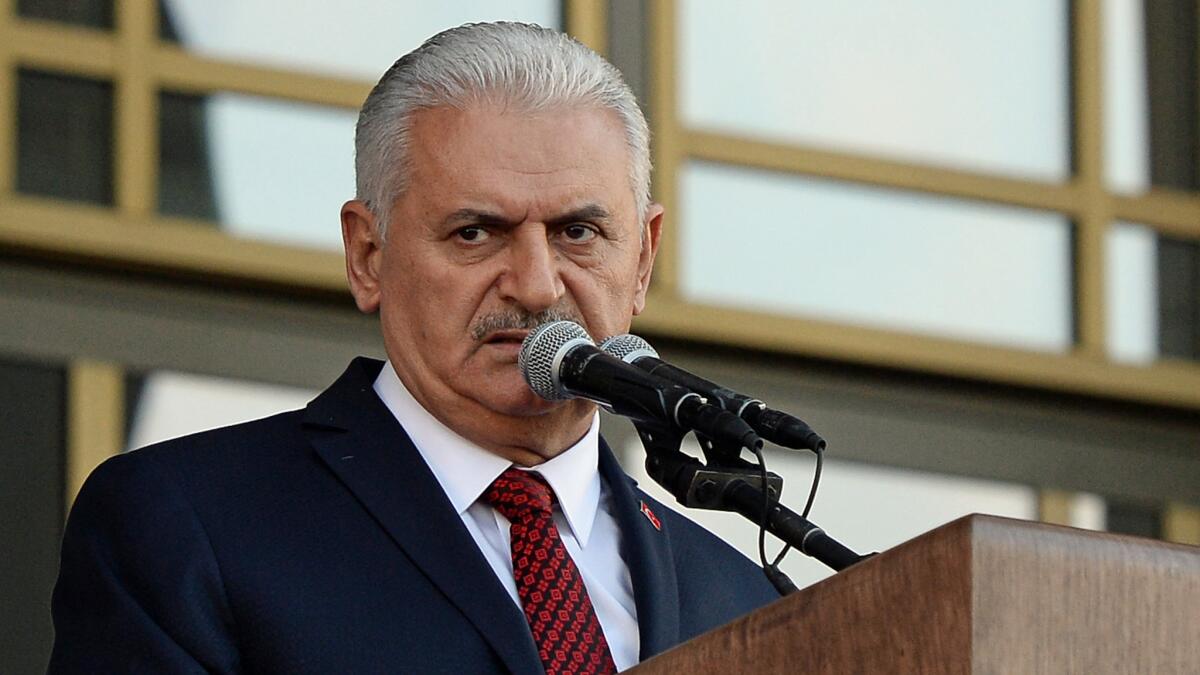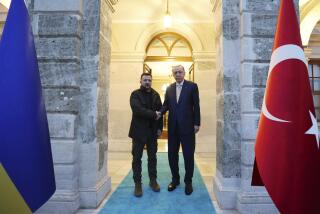Talk at a Turkish teahouse: After a raging referendum debate, a calm prevails
It was market day in this central Anatolian town, and farmers were engaged in a brisk debate at the Tea House of the Municipality over the referendum to give President Recep Tayyip Erdogan vast new powers.
The country is deeply polarized, but the tone at the teahouse was affable. Nearly all the national news media are under a tight pro-government grip, but the half-dozen men who joined the conversation here were surprisingly well informed. And no matter what the outcome, everyone seemed determined to keep the conversation going.
But there is no question who won the argument.
“Nothing will happen to the parliament” after the constitutional amendments take effect, asserted Kemal Kok, 46, a grain farmer from a nearby village who supported the switch from parliamentary democracy to a “presidential system.” Parliament and the government “will be much more effective,” he said.
“There will be no parliament,” countered Turan Sariboga, 40, a “no” supporter who tends livestock near Sivrihisar.
Kok interrupted to say that Sariboga is illiterate.
The ‘yes’ campaign thinks we are uninformed
— Turan Sariboga
“The ‘yes’ campaign thinks we are uninformed,” Sariboga responded coolly. He then proceeded to catalog the dramatic changes.
“All powers will be in the hands of the president. He has the right to dismiss parliament. He can declare war or call elections. If parliament doesn’t want to go to war, he can decide it anyway.”
Kok, the “yes” supporter, didn’t have answers.
Would Turkey soon adopt an American-style political system? a visiting reporter asked. “Close to that,” Kok replied. “Our ministers will be independent.”
“What if it’s nothing like that?” he was asked.
“I told you what I know,” he said. “I said what I wish would happen.” Challenged further, all he could say was: “I don’t know what will happen.”
Sivrihisar, a town of 20,000 60 miles southwest of Ankara, is in the electoral heartland of Erdogan’s Justice and Development party.
It’s known as the hometown to Nasreddin Hodja, the 13th century Sufi philosopher whose pranks and foibles have long enchanted children in Turkey and the Islamic world. At the end of the four-lane divided road into town, where men in orange uniforms were sweeping the street during a visit last week, there’s a statue of the cleric in a turban astride his donkey, of which he had eight.
Tales of the Hodja are droll. Take the time he was spotted riding a donkey backwards. Asked to explain, the Hodja [teacher] replies: “No, it’s the donkey that’s standing the wrong way around. “
Then there’s the tale of two neighbors who ask the Hodja to settle a quarrel when he was serving as temporary Qadi, or judge. After the first neighbor makes his complaint, the Hodja renders his judgment. “Yes, you are quite right,” he says. After the second neighbor gives his side of the story, the Hodja says he is “quite right.”
At this point, the Hodja’s wife interjects: “Husband, both men cannot be right.” To which the Hodja replies, “Yes, dear wife, you are quite right.”
The rearward-facing donkey could be a metaphor for today’s Turkey, which voted to replace a century-old parliamentary democracy with a system of one man rule -- a big step backward in the eyes of much of the rest of the world.

But the second tale, in which all sides in the neighbors’ quarrel are deemed right, sums up the mood of Sivrihisar, which like the rest of the country was divided Sunday. Sivrihisar voted 53.1% to 46% in favor of the amendments, just two points off the 51.4%-48.6% nationwide margin.
International monitors said the election fell short of human rights standards, the EU called for an investigation and Turkey’s opposition Republican People’s Party called for an annulment – only to meet a quick rejection.
Europe’s criticism, which predated the actual vote, is of little interest to the farmers at the teahouse. “That’s because they support the PKK,” said Kok. He was referring to the Kurdistan Workers Party, which revived its insurgency against the Turkish state in summer 2015.
The fighting in the southeast is a major national issue, not only because of the casualties among security forces, but also because it is widely seen as an existential threat to the Turkish state. Everyone at the table seemed ready to pounce on Turkey’s NATO allies for not recognizing this.
Does the U.S. also back the PKK? the men were asked. Those who back the PKK’s affiliate in Syria “back the PKK,” said Kok. He was referring to the U.S. decision to arm and fight with the PKK’s affiliated militia in Syria against Islamic State extremists. The U.S. claims the militia is not linked to the PKK.
Erdogan has vehemently protested the U.S. policy, and if this random sampling is any indication, the general public backs him across political lines. Reproaching the U.S., Sariboga said the PKK is listed as a terrorist organization by Turkey, the U.S. and the EU, and added that its Syrian affiliate should be treated as a terrorist organization.
Despite Erdogan’s continuing crackdown on independent media, those around the table have no big problem obtaining independent news coverage. Sariboga and others just turn to the Turkish affiliate of Fox television, possibly the last independent channel. For the last three years, Fox has been Turkey’s most-watched news programs, according to Fox staff.
Like the rest of Turkey, Sivrihisar was calm immediately after the referendum results Sunday night. “It’s just like before the referendum,” said Hulya Aydın Cesur, the Republican People’s Party leader in the town. And while small demonstrations have begun in major cities, Cesur did not expect any in Sivrihisar.
The men at the teahouse — who are acquaintances, not close friends — plan to carry on their weekly conversation. According to Kok, 10% of their lives is devoted to discussing politics.
“We will sit at the same table, no matter who wins,” said Sariboga. “We will be here again,” said Kok.
That’s the view of Halil Gobekli, the head man of a village in the Yayla district who’s an Erdogan supporter and a “yes” backer. “The spring will come. The flowers will bloom. The sun will rise. And Erdogan will have superior power,” he said.
Gutman is a special correspondent. Special correspondent Duygu Guvence contributed to this report.
More to Read
Start your day right
Sign up for Essential California for news, features and recommendations from the L.A. Times and beyond in your inbox six days a week.
You may occasionally receive promotional content from the Los Angeles Times.






